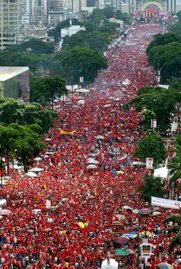
A view from Venezuela:
Orlando Chirino, a national coordinator of the UNT union federation and a leader of its C-Cura ‘classist’ tendency, writes
From the communal councils, the labour councils, the peasant councils and also councils of delegates from the armed forces, there should be born a new parliament of the people, which would then effectively represent the sectors that are most dynamic and most committed to the revolutionary process. The existing national assembly is a decrepit organism. The low participation in the December 2005 elections [25 percent] is proof that the mass of the population no longer expect much from it.
We defend something new and fully autonomous, in which the delegates have the independence and sovereignty to express the proposals of the sectors they represent. This is a vital issue, which we question in the case of the communal councils. They are financed and controlled directly by the presidency, which limits their action. They could be more representative, much better linked to the population but if they do not have independence and financial, administrative and political autonomy they will end up like the national assembly—as an appendage of the government.
It is not only a question of electing delegates from the communities, the workers and the peasants. We conceive of the councils as real organs of power. The communal councils should be those who administer all the resources for their locality, who administer and control public services, education and health, who oversee the development of infrastructural works in their locality. The labour councils should have the mission of developing the struggle for the expropriation of enterprises and exercising direct control over them. The peasant and indigenous councils should have the goal of a profound agrarian reform, the elimination of big landed property and the development of peasant cooperatives to advance agrarian production in accord with the necessities of the population.
I see the question of the councils of soldiers and middle officers of the armed forces from the same perspective. The antagonism between social classes expresses itself and develops inside the armed forces. Let’s remember what happened from 9 to 12 April 2002 [during the attempted coup against Chavez]. The councils of soldiers’ and officers’ delegates must be constituted so that they can demand their democratic rights, like the election and free removal of their superiors, to replace odious submission and blind obedience by conscious commitment to the revolution. They should have the right to organise trade unions to defend their economic and social conditions, and, above all, to link themselves to the communities and the workers so as to organise workers’ and popular militias.


No comments:
Post a Comment